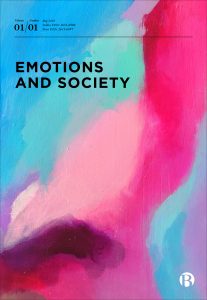CALL FOR PARTICIPATION FOR ONLINE WORKSHOP BY RN11 & EMOTIONS & SOCIETY JOURNAL
(14th & 15th of September 2023)
Instead of people presenting papers, this free online workshop is designed to facilitate discussion between sociology of emotions scholars around different topics (see PDF attached).
How to register?
Send us your affiliation, title of the session(s) you would like to join and a few lines with your motivating interest in the topic(s) to the following email address: rn11midterm2022@protonmail.com
Deadline: 2nd of July, 2023.
BOOKS
- Sarioglu, E. (2022). The Body Unburdened: Violence, Emotions, and the New Women in Turkey. Oxford: Oxford University Press. https://global.oup.com/academic/product/the-body-unburdened-9780197667644?cc=de&lang=en&
- Sauer, B. & O. Penz (2023). Konjunktur der Männlichkeit. Affektive Strategien der autoritären Rechten (“Conjuncture of Masculinity. Affective srategies of the authoritarian right”), Frankfurt: Campus Verlag.
BOOK CHAPTERS
- Poder, P. (2023). Courage, Risks and Dating in the COVID-19 Crisis. I P. Ward, & K. Foley (red.), The Emerald Handbook of the Sociology of Emotions for a Post-Pandemic World: Imagined Emotions and Emotional Futures Emerald Group Publishing.
- Pratesi, A. (2023). Doing family and intimacy at a distance. Implications for theory and social change. In: H.P. Blossfeld & H. Flam. Research Handbook in the Sociology of Emotions, 1-380, University of Bamberg, Germany: Edward Elgar Publishing.
ARTICLES
- Halperin, L. (2023). The meaning of hope for Israeli peace activists: consolidation of collective identity, antidote to despair and spiritual resource, Emotions and Society, DOI: 10.1332/263169021X16750359307077.
___ (2022) Combining emotions: hope, anger, joy, and love in Israeli peace movements,Social Movement Studies, DOI: 10.1080/14742837.2022.2155628. - Manzoor, H.; M. Nocker & I. Boncori (2022). The performativity and politics of emotions in NHS boards, Culture and Organization, 28(6): 509-527, DOI: 10.1080/14759551.2022.2105337.
- Poder, P. (2023). The end of contemporary love life? Emotions and Society. 5(1): 100-119.
https://bristoluniversitypressdigital.com/view/journals/emsoc/5/1/article-p100.xml
- Poder, P. & R. Thomsen (2022). Engagerede kærlighedsliv: En kvalitativ analyse af refleksive unges forelskelse og selvidentitets- og relationsarbejde, Dansk Sociologi. 33(1):9-31.
- Pratesi, P. (2023). Six Memos for the Current Time. Rethinking six contemporary sociological matters in light of the emotional dynamics shaping them. CAMBIO, 12: 109-123, ISSN:2239-1118.
___ (2023). Emozioni e Mutamento Sociale. Ripensare la rilevanza teorica delle emozioni alla luce di fenomeni sociali e politici emergenti. SOCIOLOGIA ITALIANA, 1-19, ISSN:2281-2652.
- Sanchez Salgado, R. (2023). The Many Faces of the Politics of Shame in European Policymaking, Policy Sciences, https://doi-org.proxy.uba.uva.nl/10.1007/s11077-023-09501-w
___ Emotions: the ultimate lobbying weapon, Politico,https://www.politico.eu/article/emotion-ultimate-lobbying-weapon/
- Sawicka, M. (2023). Managing Fear Through Digital Interactions: Emerging Narratives of the COVID-19 Pandemic in a Vaccine-Hesitant Cyber Community. Cultural Studies ↔Critical Methodologies, 0(0). https://doi.org/10.1177/15327086231165472.
- Saxonberg, S. Pavol Frič and Oľga Gyárfášová (2023). “Fear, Anger, Hope, and Pride: Negative and Positive Emotions in Electoral Behaviour,” Sociológia 55(2).
- Törnqvist, N. & Å. Wettergren (2023). “Epistemic emotions in prosecutorial decision making.” Journal of Law and Society, 50(2): 208-230.
- Ural, H. (2023). Rethinking affective publics as media rituals through temporality, performativity and liminality. Media, Culture & Society, 0(0).https://doi.org/10.1177/01634437231155557
https://journals.sagepub.com/doi/full/10.1177/01634437231155557
- Vanke, A. (2023). Co-existing structures of feeling: Senses and imaginaries of industrial neighbourhoods. The Sociological Review, 0(0). https://doi.org/10.1177/00380261221149540
It has also a video abstract: https://youtu.be/nJrL6o75Mw8
CALL FOR PAPERS (IN SPECIAL ISSUES)
- Affecting, Emoting, and Feeling Disability: Entanglements at the Intersection of Disability Studies and the Sociology of Emotion
ESA RN11 member Yvonne Wechuli is guest-editing a special issue of the journal Frontiers in Sociology, section Sociology of Emotion together with Marie Sepulchre and Kelly Fritsch. The deadline for abstracts is on 15th November 2023.
All further information can be found under the following link: https://www.frontiersin.org/research-topics/56476/affecting-emoting-and-feeling-disability-entanglements-at-the-intersection-of-disability-studies-and-the-sociology-of-emotions
- Sociologies of Health and Emotions
(editors: Gillian Bendelow, Marci Cottingham, Rebecca Olson) – the deadline for this one is approaching but will be prolonged:
https://www.frontiersin.org/research-topics/51714/sociologies-of-health-and-emotions
- Sociology of Emotion and Affect in the Age of Mis-, Dis-, and Mal-Information
(editors Alberto Bellocchi, Timothy Graham, Darren Linvill, and Stina Bergman Blix)
CALL FOR COLLOQUIUM & WORKSHOPS
- Call for the UNPOP International Colloquium: ‘Emotions, Narratives and Identities in Politics, Populism and Democracy’.
Deadline for application: 31 August 2023.
All information are available here: https://unpop.ces.uc.pt/coloquio-unpop/
- Workshop: Emotions in European Climate Politics
28th-29th September 2023, Amsterdam, organized with the support of the Amsterdam Center for European Studies (ACES). For more information contact our RN11 member Rosa Sánchez: (r.m.sanchez@uva.nl) or (a.j.telford@uva.nl)
NEWS FROM OUR PARTNER NETWORK ISA
- A new board was elected at the WG 08 « Society and Emotions » of the ISA :
President: Adrián Scribano (Argentina)
Vice-Presidents: Cécile Van de Velde (Canada, North America)
Zhang Jingting (China, Asia) Gennaro Iorio (Italy, Europe)
Secretary-Treasurer: Pedro Lisdero (Argentina/ Spain)
Newsletter Editor: Nicolas Arenas Orosio (Chile/UK)
Webpage Editor: Cecile Vermot (France) and Jeanie Hererra (Guatemala)
NEWS FROM AISLF
- The congress : Towards a sensitive society? organised by the WG 07 “Emotions and Society” of the AISLF, was held in Université de Caen, France (the call for OTTAWA congress in july 2024 is coming soon !)



